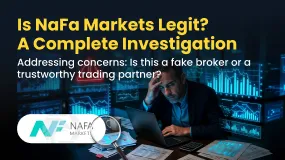Abstract:In the intricate world of forex trading, the battle between genuine financial opportunity and deceptive schemes rages on. The United Kingdom and Europe, pillars of global finance, have become battlegrounds for forex scammers utilizing sophisticated psychological tactics to exploit unsuspecting traders. This article delves into the psychology behind these scams, examining how scammers manipulate the cognitive and emotional vulnerabilities of traders.

In the intricate world of forex trading, the battle between genuine financial opportunity and deceptive schemes rages on. The United Kingdom and Europe, pillars of global finance, have become battlegrounds for forex scammers utilizing sophisticated psychological tactics to exploit unsuspecting traders. This article delves into the psychology behind these scams, examining how scammers manipulate the cognitive and emotional vulnerabilities of traders.
Creating Illusions of Legitimacy: Exploiting Trust and Authority
Forex scammers often employ tactics that create an illusion of legitimacy. They may impersonate reputable brokers or use names and logos resembling well-known financial institutions. By exploiting the trust and authority associated with established entities, scammers make it more challenging for traders to discern fraudulent activities.
FOMO (Fear of Missing Out): Capitalizing on Emotional Triggers
The Fear of Missing Out (FOMO) is a powerful psychological motivator that scammers leverage to their advantage. By creating a sense of urgency and scarcity, scammers encourage traders to make impulsive decisions without conducting thorough research. This emotional manipulation is a common tactic used to rush traders into depositing funds before they have a chance to uncover the fraudulent nature of the scheme.
Overconfidence Bias: The Trap of Unrealistic Expectations
Many traders fall victim to overconfidence bias, believing that they are immune to scams or that they possess superior judgment. Scammers exploit this cognitive bias by presenting their schemes as exclusive opportunities available only to a select few. Traders, in their overconfidence, may overlook red flags and succumb to the allure of promised riches.
Reciprocity: Building Trust to Facilitate Fraud
The principle of reciprocity, a deeply ingrained social norm, is harnessed by scammers to build trust. By offering small favors or seemingly valuable information, scammers create a sense of indebtedness, making it more likely for traders to reciprocate by investing larger sums. This manipulation of social norms serves as a foundation for more substantial fraudulent activities.
Loss Aversion: Trapping Traders in Sunk-Cost Fallacy
Scammers exploit the psychological phenomenon of loss aversion, where individuals tend to prefer avoiding losses over acquiring equivalent gains. Traders who have already invested money in a scam may be hesitant to acknowledge the loss, falling prey to the sunk-cost fallacy. This cognitive bias traps individuals in a cycle of continued investment, hoping to recover what has already been lost.
WikiFX: Equipping Traders with Psychological Armor
Recognizing and resisting psychological manipulation is essential for traders seeking to navigate the forex market safely. Educational platforms like WikiFX not only provide information about brokers but also offer resources to enhance traders' awareness of common psychological tactics used by scammers.
Visit www.wikifx.com to access WikiFX and fortify your psychological armor against forex scams.
Conclusion: Guarding Against Psychological Manipulation
As forex scammers continue to refine their psychological tactics, traders must remain vigilant and informed. By understanding the psychology behind forex scams, recognizing emotional triggers, and leveraging resources like WikiFX, traders can guard against manipulation and make decisions based on logic and evidence rather than falling prey to deceptive schemes. In the evolving landscape of forex trading, knowledge is the key to resilience against psychological manipulation.










